To facilitate continuous professional growth and development of faculty members.
To provide opportunities for faculty to acquire new skills, knowledge, and pedagogical techniques.
To enhance the quality of teaching and learning methodologies within the institution.
To foster an environment that promotes innovative and effective teaching practices.
To encourage and support faculty engagement in meaningful research and scholarly activities.
To contribute to the creation of a vibrant intellectual community within the institution.
To equip faculty with the necessary technological skills and tools to enhance the educational experience.
To promote the integration of technology into teaching and research processes.
To focus on strategies that positively impact student success and engagement.
To cultivate a student-centered learning environment through faculty development initiatives.
To position the institution as a leader in providing high-quality education through the development of its faculty.
To foster a culture of innovation and creativity in teaching and research methodologies.
To enhance the institution's global recognition by producing well-rounded and highly skilled graduates.
To promote collaboration and networking among faculty members, both within the institution and with external academic communities.
To establish a culture of continuous improvement, where faculty members are committed to lifelong learning and development.
To encourage faculty involvement in community service, outreach programs, and initiatives that contribute to societal development.
To align the Faculty Development Programme with the overall goals and strategic objectives of the institution.
To improve the pedagogical skills of faculty members, fostering innovative and effective teaching methods.
To promote student-centered approaches and active learning strategies.
To encourage and support faculty engagement in research and scholarly activities.
To provide resources and mentorship for faculty pursuing advanced degrees or conducting impactful research.
To ensure that faculty members stay current with the latest developments, trends, and advancements in their respective fields.
To provide training on emerging technologies and methodologies relevant to teaching and research.
To equip faculty with leadership and administrative skills necessary for roles such as department chairs, program coordinators, or other administrative positions.
To foster a culture of academic leadership within the institution.
To encourage collaboration and interdisciplinary interactions among faculty members.
To create opportunities for faculty to engage in cross-disciplinary projects and initiatives.
To enhance the technological proficiency of faculty members.
To promote the effective integration of technology in curriculum development, course delivery, and assessment.
To promote inclusive teaching practices that accommodate diverse student populations.
To raise awareness of cultural competence and sensitivity among faculty members.
To enhance faculty skills in designing effective assessments and evaluating student learning outcomes.
To promote the use of data-driven approaches for continuous improvement.
To facilitate networking and collaboration among faculty members within the institution and with external academic communities.
To provide opportunities for sharing best practices and experiences.
To promote faculty well-being and work-life balance through programs addressing stress management, time management, and self-care.
To ensure that the Faculty Development Programme aligns with the overall goals and strategic priorities of the institution.

This report provides an overview of the Faculty Development Program (FDP) conducted on institutional development. The FDP aimed to enhance the knowledge and skills of participants in various aspects of institutional development, including strategic planning, leadership, governance, and quality assurance.
To familiarize participants with the concept and importance of institutional development in higher education.
To provide participants with an understanding of strategic planning and its role in institutional growth and sustainability.
To enhance participants' leadership and management skills for effective institutional governance.
To promote a culture of quality assurance and continuous improvement within the institution.
The FDP was conducted through a combination of lectures, interactive sessions, case studies, workshops, and group discussions. Experts in the field of institutional development and higher education management were invited to share their knowledge and experiences. Participants were encouraged to actively engage in discussions, share their institutional challenges, and seek solutions collaboratively.
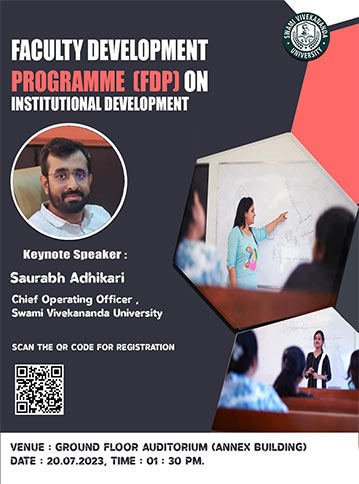
Understanding institutional development: Participants were introduced to the concept of institutional development and its significance in the context of higher education. They learned about the key components of institutional development, including strategic planning, leadership, governance, and quality assurance.
Strategic planning: The FDP focused on the importance of strategic planning in institutional development. Participants learned about the process of developing a strategic plan, including conducting a SWOT analysis, setting goals and objectives, and implementing strategies for achieving them.
Leadership and governance: The program emphasized the role of effective leadership and governance in institutional development. Participants gained insights into leadership styles, decision-making processes, and the importance of fostering a collaborative and inclusive culture within the institution.
Quality assurance: The FDP addressed the significance of quality assurance in institutional development. Participants learned about quality assurance frameworks, accreditation processes, and the importance of continuous improvement in maintaining and enhancing institutional quality.
Change management: The program explored the challenges and strategies associated with managing change within an institution. Participants learned about change management models, communication strategies, and the role of leadership in facilitating successful organizational change.
Enhanced knowledge and skills: Participants developed a deeper understanding of institutional development and acquired practical skills in strategic planning, leadership, governance, and quality assurance.
Improved institutional planning and management: The FDP equipped participants with the tools and techniques to develop and implement effective strategic plans, enhance leadership and governance practices, and establish quality assurance mechanisms within their institutions.
Collaboration and networking: The program provided a platform for participants to connect with experts and fellow educators, fostering potential collaborations and sharing of best practices in institutional development.
Institutional growth and sustainability: It is expected that the knowledge and skills gained through the FDP will contribute to the overall growth and sustainability of the participating institutions, leading to improved academic outcomes and institutional reputation.
The FDP on institutional development successfully achieved its objectives of enhancing participants' knowledge and skills in strategic planning, leadership, governance, and quality assurance. The program equipped participants with practical tools and strategies to drive institutional growth and sustainability. It is anticipated that the knowledge gained will positively impact the participating institutions, leading to improved academic outcomes and institutional excellence.
Time management is a crucial skill for effective teaching and productivity in the teaching fraternity. With the increasing demands on teachers' time, it is essential to have strategies in place to manage time effectively. This report aims to provide an overview of time management skills that can be applied by teachers to optimize their productivity and efficiency.
Teachers should prioritize their tasks and activities to ensure that they are focusing on the most important and urgent tasks first. This can help them manage their workload effectively and reduce stress.
Effective lesson planning is critical to successful teaching. Teachers should allocate sufficient time for lesson planning, including preparing engaging and interactive lesson materials, and ensuring that they are aligned with the curriculum and learning objectives.
Teachers can benefit from various time management techniques such as the Pomodoro Technique, which involves working in focused intervals (typically 25 minutes) followed by a short break. This can help them stay focused and avoid burnout.

Effective classroom management is critical to ensuring that teaching and learning are productive and efficient. Teachers should establish clear routines and expectations, and allocate time for transitions and unexpected interruptions.
Teachers can benefit from collaborating with their colleagues to share resources, ideas, and best practices. This can help them save time and reduce workload.
Technology can be a powerful tool for time management in teaching. Teachers can use tools such as learning management systems, digital calendars, and time tracking software to streamline their work and increase productivity.
Teachers should prioritize their own well-being and self-care to avoid burnout. This can include taking breaks, engaging in physical activity, and seeking support from colleagues and mentors.
Teachers should be flexible and adaptable in their approach to time management. They should be willing to adjust their plans and priorities as needed to accommodate unexpected events and challenges.
Effective communication is critical to successful time management in teaching. Teachers should communicate clearly and respectfully with their students, colleagues, and parents to ensure that everyone is aware of expectations and deadlines.
Teachers should regularly reflect on their time management strategies and evaluate their effectiveness. They should be willing to make adjustments and try new approaches to improve their productivity and efficiency.
The FDP on institutional development successfully achieved its objectives of enhancing participants' knowledge and skills in strategic planning, leadership, governance, and quality assurance. The program equipped participants with practical tools and strategies to drive institutional growth and sustainability. It is anticipated that the knowledge gained will positively impact the participating institutions, leading to improved academic outcomes and institutional excellence.
1. Provide professional development opportunities for teachers on time management skills.
2. Encourage teachers to prioritize their well-being and self-care to avoid burnout.
3. Support teachers in integrating technology into their work to streamline processes and increase productivity.
4. Encourage collaboration among teachers to share resources and best practices.
5. Provide resources and support for teachers to develop effective classroom management skills.
6. Encourage teachers to reflect on their time management strategies and make adjustments as needed.
By implementing these recommendations, teachers can improve their time management skills and optimize their productivity and efficiency, ultimately leading to better outcomes for students.
The FDP (Faculty Development Program) on time management skills for teaching fraternity, organized by the Department of Education at Xavier University, Bhubaneswar, aimed to help faculty members manage their time effectively in order to enhance their teaching and research productivity. The program d was attended by faculty members from various institutions across India.
The report highlights the following key takeaways from the FDP:
The program began with an introduction to time management, which was defined as the ability to use time efficiently and effectively to achieve one's goals. The participants were encouraged to reflect on their own time management habits and to identify areas for improvement.
: The program emphasized the importance of prioritizing tasks based on their urgency and importance. The participants learned how to use the Eisenhower Matrix, a time management tool that helps to categorize tasks into four quadrants based on their urgency and importance.
The program provided strategies for planning and scheduling tasks, such as setting SMART goals, creating a daily to-do list, and using time blocking techniques. The participants learned how to allocate time for teaching, research, administrative tasks, and personal activities.
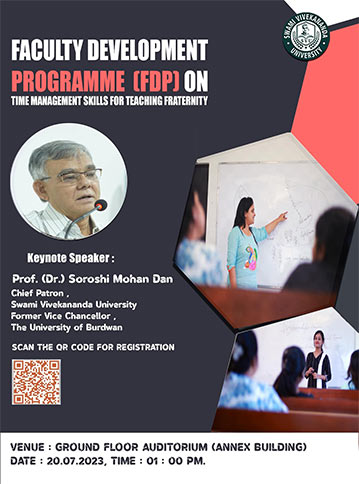
The program discussed the importance of delegating and outsourcing tasks to others in order to free up time for more important tasks. The participants learned how to identify tasks that can be delegated, how to delegate effectively, and how to outsource tasks to external service providers.
The program highlighted the importance of managing distractions, such as email, social media, and meetings, in order to stay focused and productive. The participants learned how to minimize distractions, how to manage email overload, and how to conduct effective meetings.
The program provided strategies for enhancing productivity, such as using time management apps, practicing mindfulness, and taking breaks. The participants learned how to use time management apps such as Trello, Asana, and RescueTime, how to practice mindfulness meditation, and how to take effective breaks.
The FDP on time management skills for teaching fraternity highlights the importance of managing time effectively in order to enhance teaching and research productivity. The program provided strategies for prioritizing tasks, planning and scheduling, delegating and outsourcing, managing distractions, and enhancing productivity. The report recommends that similar programs be organized in other institutions to help faculty members manage their time more efficiently and effectively.
Some additional tips for time management that were discussed during the program include:
1. Setting realistic goals and deadlines
2. Avoiding multitasking and focusing on one task at a time
3. Learning to say no to unnecessary commitments
4. Practicing self-discipline and avoiding procrastination
5. Taking care of physical and mental health to improve productivity
6. Continuously reviewing and improving time management strategies.
This report aims to provide an overview of the Faculty Development Program (FDP) conducted on time management skills for the teaching fraternity. The FDP focused on equipping educators with effective strategies and techniques to manage their time efficiently, leading to increased productivity and improved work-life balance.
The FDP had the following objectives:
a) To raise awareness about the importance of time management in the teaching profession.
b) To provide participants with practical tools and techniques to prioritize tasks and manage their time effectively.
c) To enhance participants' ability to set realistic goals and deadlines.
d) To promote a healthy work-life balance among educators.
The FDP was conducted through a combination of lectures, interactive sessions, case studies, and hands-on activities. Participants were encouraged to share their experiences and challenges related to time management, facilitating peer learning and collaboration. The program also included practical exercises and simulations to reinforce the concepts taught.
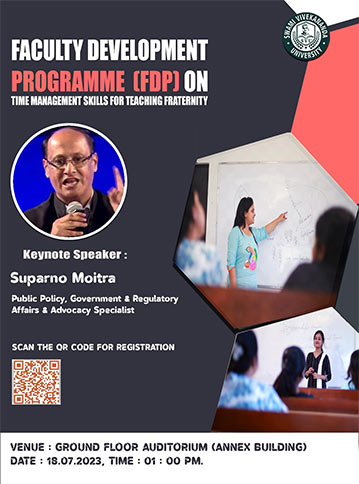
a) Understanding time management: Participants were introduced to the concept of time management and its relevance in the teaching profession. They learned about the benefits of effective time management, including increased productivity, reduced stress, and improved job satisfaction.
b) Setting goals and priorities: The FDP focused on helping participants set clear goals and priorities, both in their professional and personal lives. They learned techniques such as SMART goal setting and the Eisenhower Matrix to prioritize tasks based on their importance and urgency.
c) Planning and scheduling: Participants were introduced to various planning and scheduling tools, such as to-do lists, calendars, and digital apps. They learned how to create effective schedules, allocate time for different tasks, and avoid common time-wasting activities.
d) Delegation and time-saving strategies: The program emphasized the importance of delegation and effective communication in saving time. Participants learned how to delegate tasks to colleagues or students, as well as techniques to streamline administrative work and reduce unnecessary meetings.
e) Work-life balance: The FDP addressed the challenge of maintaining a healthy work-life balance in the teaching profession. Participants learned strategies to manage their time effectively, set boundaries, and prioritize self-care activities.
a) Improved time management skills: Participants developed a better understanding of time management principles and acquired practical tools and techniques to manage their time effectively.
b) Increased productivity: The FDP equipped educators with strategies to prioritize tasks, set goals, and avoid time-wasting activities, leading to increased productivity in their professional roles.
c) Reduced stress: Participants learned how to manage their workload and set realistic deadlines, resulting in reduced stress levels and improved overall well-being.
d) Enhanced work-life balance: The FDP emphasized the importance of maintaining a healthy work-life balance. Participants gained insights and strategies to allocate time for personal activities, leading to improved satisfaction and fulfillment in both personal and professional domains.
The FDP on time management skills for the teaching fraternity successfully achieved its objectives of equipping educators with effective strategies to manage their time efficiently. The program provided participants with practical tools and techniques to prioritize tasks, set goals, and maintain a healthy work-life balance. It is expected that the knowledge and skills gained will positively impact the participants' professional lives, leading to increased productivity, reduced stress, and improved overall well-being.
The purpose of this report is to provide an overview of the Faculty Development Program (FDP) conducted on Indian Cultural Heritage. The FDP aimed to enhance the knowledge and understanding of participants about the rich cultural heritage of India and its significance in various aspects of society.
The FDP had the following objectives:
a) To familiarize participants with the diverse cultural heritage of India.
b) To explore the historical, artistic, and architectural aspects of Indian culture.
c) To understand the influence of Indian cultural heritage on various fields such as literature, music, dance, and spirituality.
d) To promote the preservation and conservation of Indian cultural heritage.
The FDP was conducted through a combination of lectures, interactive sessions, workshops, and field visits. Experts in the field of Indian cultural heritage were invited to deliver lectures and share their knowledge and experiences. Participants were encouraged to actively engage in discussions and hands-on activities to deepen their understanding.

a) Historical overview of Indian cultural heritage: Participants were provided with a comprehensive understanding of the historical development of Indian culture, including the Indus Valley Civilization, Vedic period, and the influence of various dynasties and empires.
b) Art and architecture: The FDP explored the rich artistic traditions of India, including the various schools of painting, sculpture, and architecture. Participants learned about iconic structures such as the Taj Mahal, Ajanta and Ellora caves, and the temples of South India.
c) Literature and performing arts: The program highlighted the significant contributions of Indian literature, including ancient texts like the Vedas, Ramayana, and Mahabharata. Participants also gained insights into classical dance forms like Bharatanatyam, Kathak, and Odissi, as well as traditional music and theater.
d) Spiritual and philosophical traditions: The FDP delved into the spiritual and philosophical aspects of Indian culture, including the teachings of ancient sages and the influence of religions like Hinduism, Buddhism, and Jainism.
a) Enhanced knowledge: Participants gained a deeper understanding of Indian cultural heritage, its historical context, and its impact on various aspects of society.
b) Appreciation and preservation: The FDP fostered a greater appreciation for the need to preserve and conserve Indian cultural heritage for future generations.
c) Interdisciplinary connections: Participants recognized the interdisciplinary nature of Indian cultural heritage and its relevance to fields such as history, art, literature, and spirituality.
d) Networking and collaboration: The FDP provided a platform for participants to connect with experts and fellow educators, fostering potential collaborations and future research opportunities.
The FDP on Indian Cultural Heritage successfully achieved its objectives of enhancing knowledge, appreciation, and preservation of India's rich cultural heritage. The program equipped participants with valuable insights and resources to incorporate Indian cultural heritage into their teaching and research endeavors. It is hoped that the knowledge gained will be disseminated to students and contribute to a broader understanding and appreciation of Indian culture.
This report provides an overview of the Faculty Development Program (FDP) conducted on research paper writing and publication in Scopus/WoS (Web of Science) journals. The FDP aimed to equip participants with the necessary skills and knowledge to effectively write research papers and successfully publish them in reputable journals indexed in Scopus or WoS.
The FDP had the following objectives:
a) To familiarize participants with the publication process in Scopus/WoS journals.
b) To enhance participants' understanding of the requirements and standards for publishing in high-impact journals.
c) To provide participants with practical guidance on research paper writing, including structuring, formatting, and language usage.
d) To equip participants with strategies for selecting appropriate journals, handling peer review comments, and increasing the chances of acceptance.
The FDP was conducted through a combination of lectures, workshops, hands-on exercises, and case studies. Experts in the field of research paper writing and publication were invited to share their experiences and provide guidance. Participants were encouraged to actively engage in discussions, share their research experiences, and seek feedback on their work.
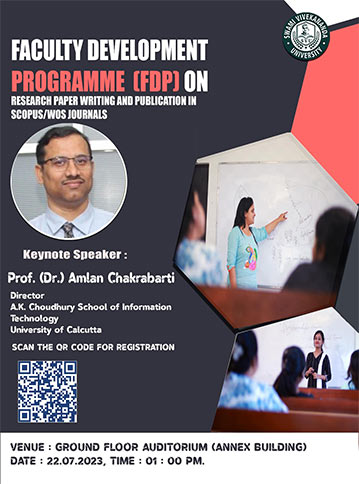
a) Understanding Scopus/WoS journals: Participants were introduced to the significance of Scopus/WoS journals in academic publishing and their impact on research visibility and career advancement. They learned about the indexing criteria, citation metrics, and the importance of selecting appropriate journals for publication.
b) Research paper writing essentials: The FDP focused on the essential components of a research paper, including the title, abstract, introduction, methodology, results, discussion, and conclusion. Participants learned about the importance of clear and concise writing, logical flow, and adherence to journal guidelines.
c) Literature review and referencing: Participants gained insights into conducting a comprehensive literature review and effectively integrating previous research into their papers. They learned about different referencing styles and tools to ensure accurate and consistent citations.
d) Ethical considerations and plagiarism: The FDP emphasized the importance of ethical research practices and the consequences of plagiarism. Participants learned about proper citation practices, avoiding self-plagiarism, and maintaining research integrity.
e) Submission and peer review process: Participants were guided through the submission process, including preparing cover letters, responding to reviewer comments, and revising manuscripts. They learned strategies to handle peer review feedback constructively and increase the chances of acceptance.
a) Improved research paper writing skills: Participants developed a better understanding of the essential components and structure of research papers, enabling them to write more effectively and concisely.
b) Enhanced knowledge of publication standards: The FDP equipped participants with the knowledge of publication standards and requirements for Scopus/WoS journals, enabling them to select appropriate journals and increase the chances of acceptance.
c) Increased familiarity with the submission process: Participants gained practical insights into the submission and peer review process, enabling them to navigate the publication process more effectively.
d) Networking and collaboration opportunities: The FDP provided a platform for participants to connect with experts and fellow researchers, fostering potential collaborations and future research opportunities.
The FDP on research paper writing and publication in Scopus/WoS journals successfully achieved its objectives of enhancing participants' skills and knowledge in academic publishing. The program equipped participants with practical guidance on research paper writing, selecting appropriate journals, and handling the submission and peer review process. It is expected that the knowledge gained will contribute to increased research productivity, visibility, and career advancement for the participants.
The FDP (Faculty Development Program) on research paper writing and publication in Scopus/WoS journals, organized by the Department of Management Studies at Indian Institute of Technology (IIT) Gandhinagar, aimed to help faculty members write and publish high-quality research papers in Scopus and Web of Science (WoS) indexed journals. The was attended by faculty members from various institutions across India.
1. Understanding the Research Process: The program began with an introduction to the research process, which was defined as a systematic and iterative process of generating new knowledge. The participants were encouraged to reflect on their own research processes and to identify areas for improvement.
2. Conducting Literature Review: The program emphasized the importance of conducting a thorough literature review, which is the process of reviewing existing literature on a topic. The participants learned how to identify relevant literature, how to critically evaluate literature, and how to synthesize literature.
3. Developing Research Questions: The program discussed the importance of developing research questions, which are the questions that guide the research process. The participants learned how to develop research questions that are relevant, focused, and feasible.
4. Designing Research Methodology: The program provided strategies for designing research methodology, which is the process of selecting research design and research methods. The participants learned how to select appropriate research design, how to select appropriate research methods, and how to ensure the validity and reliability of research findings.
5. Writing Research Papers: The program provided strategies for writing research papers, such as using APA style, structuring the paper, and using clear and concise language. The participants learned how to write an abstract, how to write an introduction, and how to write a conclusion.
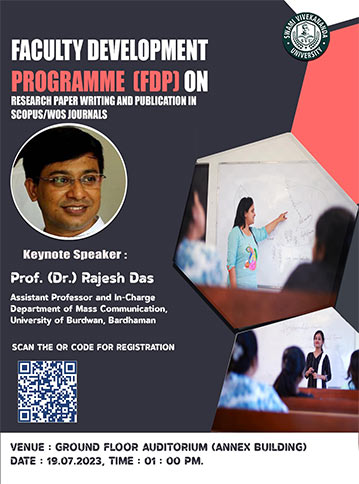
6. Submitting and Publishing Research Papers: The program discussed the process of submitting and publishing research papers, such as selecting appropriate journals, preparing the manuscript, and responding to reviewers' comments. The participants learned how to prepare a manuscript for submission, how to respond to reviewers' comments, and how to follow the journal's submission guidelines.
7. Enhancing Research Impact: The program provided strategies for enhancing research impact, such as using social media, collaborating with other researchers, and participating in conferences. The participants learned how to use social media to promote research, how to collaborate with other researchers, and how to participate in conferences.
The FDP report on research paper writing and publication in Scopus/WoS journals highlights the importance of understanding the research process, conducting a thorough literature review, developing research questions, designing research methodology, writing research papers, submitting and publishing research papers, and enhancing research impact. The program provided strategies for each of these stages, and the report recommends that similar programs be organized in other institutions to help faculty members write and publish high-quality research papers in Scopus and WoS indexed journals.
Telinipara, Barasat - Barrackpore Rd Bara Kanthalia, West Bengal - 700121.
